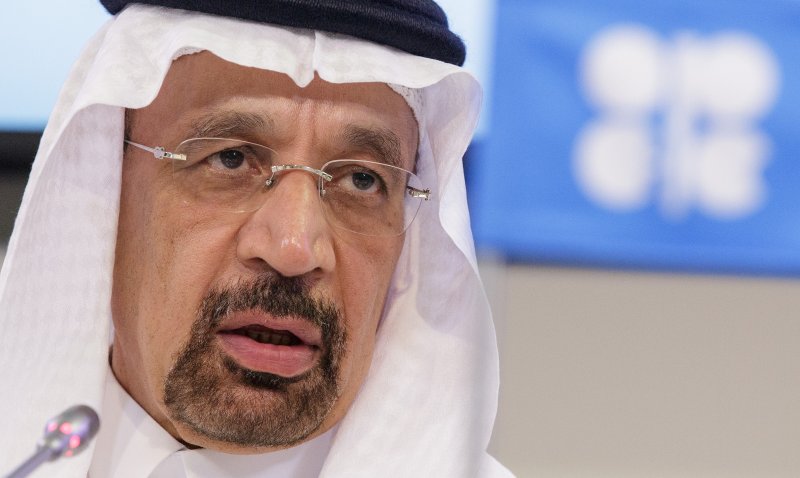Saudi Oil Minister Khalid al-Falih says the multilateral effort to balance the market with production declines isn't threatened by OPEC member exempt from the agreement. Photo by Lisi Niesner/EPA
June 19 (UPI) -- The OPEC members exempt from an effort to balance the markets through production declines pose no threat to objectives, Saudi Arabia's oil minister said.
Saudi Arabia is the largest contributor within the Organization of Petroleum Exporting Countries to ease supply-side strains through coordinated efforts to sideline about 2 percent of the total demand for oil. Member states Libya and Nigeria are exempt from the agreement so they can steer oil revenue toward national security efforts.
Secondary industry sources told OPEC economists that Nigerian crude oil production in May increased 11 percent to about 1.7 million barrels per day. Libyan crude oil production increased more than 30 percent to 730,000 bpd and the director of the state oil company said last week that total production should hit the 1 million bpd mark by the end of July.
Speaking to London-based newspaper Asharq al-Awsat, Saudi Oil Minister Khalid al-Falih said on Libya in particular that it wasn't his place to weigh in on what he described as a slow pace of recovery in production.
"They shouldn't be considered a threat to the initiative," he was quoted as saying.
On Nigeria, a national subsidiary of Shell in early June lifted force majeure, a contractual condition related to circumstances beyond the control of the parties involved, for exports from the Forcados terminal in Nigeria following repairs to an export artery. Ole Hanson, the head of commodity strategy at SaxoBank, told UPI at the time the move, which ended an export restriction that lasted more than a year, could lead to another 250,000 bpd from Nigeria.
Falih said that contributors to the agreement include major producers outside of OPEC like Russia and 10 other oil-rich nations. The effort has been balanced, however, by an increase in oil production from shale basins in the United States, which have been more resilient to lower crude oil prices than expected.
"Current expectations indicate the market to rebalance in the fourth quarter of this year taking into account an increase in shale oil production," he said.















